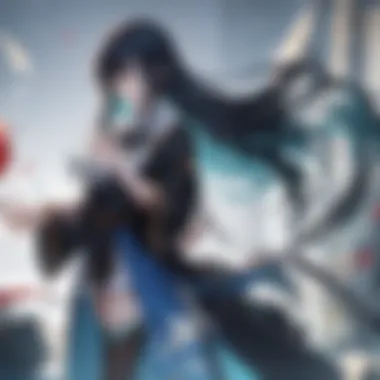Exploring the Best Psychological Anime on Funimation


Intro
Psychological anime offers a unique lens through which viewers can explore complex emotional landscapes, pushing boundaries of narrative and character design. This genre compels the audience to engage intellectually, challenging them to consider themes of identity, morality, and the human psyche itself. Funimation serves as a reliable platform hosting a variety of such series, making it a prominent destination for those who seek thought-provoking narratives.
In this article, we will examine selected titles available on Funimation that highlight these psychological elements. Each series chosen not only exhibits compelling character arcs but also delves into intricate themes that have resonated with audiences worldwide. By analyzing these works deeply, we aim to enrich the viewing experience and provide insight for both new and seasoned fans alike.
Character Analysis
Overview of Character Development
In psychological anime, character development is paramount. It shapes the viewer's connection with the narrative. Characters often undergo significant transformations, influenced by their environments, memories, or psychological states. For instance, in Steins;Gate, the protagonist Rintarou Okabe grapples with the burden of time travel, leading him to confront his past decisions. His evolution from a self-proclaimed mad scientist to a more grounded individual illustrates the fragility of human emotion and responsibility.
Other series like Paranoia Agent present a different approach. The characters often represent broader societal issues, with their development paralleling the psychological breaks of the community. Each character reveals layers of fear and desire, contributing to a more comprehensive understanding of the show's critique on modern existence.
Key Relationships and Dynamics
Key relationships frequently drive character motivations and reveal deeper psychological scars. In Death Note, the tension between Light Yagami and L showcases a battle of wits and moral philosophies. Their interactions epitomize the struggle between justice and vengeance, illustrating how their rivalry shapes their identities.
Additionally, Perfect Blue explores the dynamics between reality and illusion, particularly through Mima’s relationships with her managers and fans. These connections serve to highlight her inner turmoil and the impact of external expectations on her psyche.
Thematic Exploration
Central Themes and Messages
The themes prevalent in psychological anime often challenge our understanding of reality. Series like Monster delve into the nature of evil, questioning what truly defines a monster. It raises implications about moral ambiguity and the consequences of one’s choices.
In contrast, The Tatami Galaxy explores the theme of choice and consequence, shedding light on the pivotal moments that shape life paths. The series illustrates how small decisions can lead to vastly different outcomes, reflecting on the complexity of human experience.
Cultural Context and Influences
The context in which these anime are created also plays a significant role in their themes. Many psychological anime reflect societal anxieties and cultural critiques. For example, Tokyo Ghoul addresses themes of identity and belonging, mirroring contemporary struggles with acceptance and duality. This parallel allows audiences to relate more deeply to the characters’ experiences.
"The psychological depth found in anime invites viewers to embark on a journey of introspection alongside the characters, fostering both empathy and critical thinking."
Using psychological elements, these series offer rich narratives that resonate across cultures, making them relevant in both Japanese and global contexts.
Understanding Psychological Anime
Psychological anime represents a unique subgenre that not only entertains but also provokes thought and introspection. This article aims to illuminate the intricacies of psychological anime available on Funimation, emphasizing its thematic richness and complex characterizations. Understanding psychological anime is essential for appreciating how narratives can explore the depths of the human psyche, moral dilemmas, and existential themes.
Defining Psychological Themes
Psychological themes in anime delve deep into the mental and emotional states of characters. These themes often include:
- Identity Crisis: Characters frequently grapple with their sense of self, often leading to profound personal journeys.
- Mental Illness: Representation of various mental health conditions is prominent, allowing viewers to engage with serious issues in an accessible format.
- Perception of Reality: Many psychological series challenge the viewer's understanding of what is real versus what is imagined, creating a layered narrative experience.
These themes serve as a mirror, reflecting societal fears, desires, and the nuances of human behavior.
Characteristics of the Genre
Psychological anime is marked by several defining characteristics that separate it from other anime genres:


- Character Depth: Expect multi-dimensional characters whose internal struggles drive the plot. Their backstories are often as critical as the main narrative.
- Complex Plots: Unlike straightforward narratives, these series weave intricate plots that require active viewer engagement.
- Subtle Symbolism: Themes are often conveyed through symbols and motifs, rather than overt statements, encouraging deeper analysis.
- Atmospheric Tension: The creation of suspense through psychological manipulation is prevalent. The emotional climate can shift frequently, keeping viewers on edge.
"In psychological anime, not all is as it seems. The mind plays tricks, revealing the complex layers of character motivations and fears."
Grasping these characteristics not only enhances the viewing experience but also fosters a greater appreciation for the medium's ability to discuss significant real-life themes.
The Importance of Funimation
Funimation stands as a pivotal player in the realm of anime streaming, providing not only access to captivating visual stories but also serving as a platform that supports diversity in storytelling. Its significance in this article lies in its role as a curator of psychological anime, which often delve into complex themes and multilayered characters. In contemporary discussions about anime, Funimation emerges not merely as a hosting service but as a facilitator of profound narratives that challenge viewers intellectually and emotionally.
Platform Overview
Funimation operates as a premier streaming service, specializing in anime, with a particular focus on dubbed content in English. This focus opens the world of anime to audiences who may not speak Japanese fluently but still have a thirst for compelling stories. The interface is user-friendly, allowing viewers to easily navigate through its extensive catalog. Moreover, the platform frequently updates its library to include both new releases and critically acclaimed classics.
In addition to its wide assortment of anime, Funimation offers an array of engaging features such as simulcasts, which allow viewers to watch series almost immediately after their broadcast in Japan. This immediacy enhances viewer engagement and fosters community discussions around the latest episodes. Furthermore, Funimation provides options for subtitles and various language settings, catering to a global audience.
Vast Anime Library
The breadth of Funimation's anime library is worth noting, especially concerning psychological anime. The platform features a vast collection that ranges from mainstream hits to niche titles, ensuring that viewers can find something that resonates with their tastes.
Within this library, psychological series often examine the depths of human experience, exploring themes like trauma, reality, and morality. Some notable aspects of the library include:
- Diversity of Titles: Funimation hosts an impressive selection of psychological anime, such as Steins;Gate and Paranoia Agent, each presenting unique takes on the human psyche.
- Accessibility: Many series are available for binge-watching, allowing for an uninterrupted immersion into the narrative. This format is quintessential for psychological series, as it enables viewers to be drawn into the intricate plotlines and character arcs without lengthy pauses.
- Community Engagement: Funimation fosters a community atmosphere where fans of psychological anime can engage with one another. Forums, social media interactions, and events enhance this communal experience, making discussions around mental health and psychological themes more prevalent.
Noteworthy Psychological Anime on Funimation
Psychological anime provides a unique lens into the human experience, dissecting themes of mind, emotion, and societal pressures. Funimation, known for its robust library, offers a variety of such series that not only entertain but also provoke thought. This section highlights noteworthy titles that showcase complex narratives and deep character explorations. Understanding why these selections are significant can enhance the viewing experience.
Series One: An Overview
Plot Summary
The plot summary serves as a foundation for understanding the overall narrative of a series. It often sets the stage for the unfolding psychological elements. In this case, a compelling plot can maintain viewer interest and lead to deeper engagement with the material. For example, a nonlinear storyline may create suspense, encouraging viewers to piece together the narrative. This unique structure adds layers, making the viewing experience more rewarding. However, a less cohesive plot might confuse audiences and detract from the intended message.
Character Analysis
Character analysis delves into the minds and motivations of individuals within the narrative. In psychological anime, character development is crucial. The depth of a character often mirrors the complexity of the theme addressing mental states or ethical choices. Viewers connect more with shows that showcase multifaceted characters, perhaps dealing with their own psychological struggles. However, if characters are underdeveloped, this can lead to a disconnect with the audience.
Thematic Exploration
Thematic exploration is essential in understanding the layers present within the story. It involves identifying the central ideas that resonate throughout the episodes. In a psychological context, themes such as isolation, guilt, or morality may be examined. These themes invite viewers to reflect on their implications and relevance to real-world scenarios. A limited thematic scope prevents deeper understanding, thus diminishing the anime's overall impact.
Series Two: An Overview
Plot Summary
In this series, the plot intricately weaves together personal and societal dilemmas. Such complexities are essential for establishing tension and conflict. The layered progression of events often reflects the disorder in the characters’ minds. A well-constructed plot encourages discussions on mental health and societal norms. However, if the plot becomes convoluted, it may lose its efficacy and fail to engage the audience meaningfully.
Character Development
Character development in this series captures a journey of growth or decline. The evolution of characters can emphasize themes of redemption or despair. Characters that undergo significant transformation resonate well with audiences. They experience struggles that reflect real-life issues, making the stories relatable. Conversely, stunted character development may lead to a predictable narrative, failing to leave a lasting impression.


Thematic Depth
This series offers robust thematic depth. It examines concepts like trauma, identity crisis, and the search for meaning. Themes are layered, providing various interpretations. The complexity allows for richer discussions among viewers. A series lacking thematic depth may seem superficial, limiting its appeal.
Series Three: An Overview
Plot Summary
The plot of this series captivates audiences with twists that keep viewers guessing. As it unfolds, the depth of psychological elements becomes increasingly apparent. Tension mounts, creating a gripping atmosphere. However, if not executed well, excessive twists may feel forced.
Character Relationships
Character relationships in this series are pivotal. They often serve as a reflection of internal psychological states rather than mere external interactions. The dynamics between characters can enhance the themes of trust, betrayal, and connection. While compelling relationships foster empathy, shallow connections may not evoke strong reactions from the audience.
Psychological Impact
This series leaves a considerable psychological impact on its audience. It raises questions about ethical choices and personal responsibility. Engaging narratives encourage reflection on viewer’s own experiences, making it more meaningful. Failure to evoke such emotions can diminish a series' effectiveness.
Series Four: An Overview
Plot Summary
The plot presents a compelling backdrop that heightens the exploration of human emotions. It skillfully integrates various conflicts that mirror real-life psychological struggles. A strong plot keeps viewers engaged and prompts discussions regarding its themes. However, if the execution falters, it could alienate viewers.
Narrative Structure
Narrative structure plays a significant role in how the plot is received. A nonlinear or fragmented structure might reflect the chaos of the characters’ minds, contributing to a more immersive experience. While some viewers appreciate this complexity, others might find it challenging to follow.
Viewer Reception
The reception of this series has been varied, with some praising its depth while others criticize its pacing. Understanding viewer perspectives is essential for gauging the effectiveness of psychological elements present in the story. Positive reception often indicates successful thematic exploration, while negative reviews may point out flaws in narrative execution.
Series Five: An Overview
Plot Summary
The plot delves into challenging themes, offering a panorama of psychological conflict. It raises questions about reality versus perception, encouraging viewers to engage critically with the content. However, complexity can be a double-edged sword; if poorly conveyed, it may confuse rather than enlighten.
Thematic Analysis
Thematic analysis reveals crucial messages embedded in the narrative. This series tackles issues like fear, anxiety, and the impact of societal expectations. Rich themes elevate the plot, encouraging viewers to reflect on their own lives. Limited thematic analysis can result in a lack of resonance for the audience.
Cultural Context
Cultural context enriches the narrative, providing insight into societal norms and issues. Understanding the cultural background helps viewers grasp the significance of psychological conflicts presented. However, neglecting this aspect could render some themes less impactful, causing potential misunderstanding now regarding the series’ intentions.
Themes Commonly Explored
Psychological anime often delves into a variety of profound themes that resonate deeply with viewers. Exploring these themes is essential in understanding the complexity and richness of the genre. Psychological anime does not just entertain; it provokes thought and reflection on real-life issues often overlooked in mainstream media. The significance of these themes cannot be understated as they contribute to a broader cultural dialogue.
Mental Health and Awareness


One of the most pressing themes in psychological anime is mental health and awareness. Stories often reflect the challenges individuals face, particularly those coping with mental illness. By portraying characters with psychological struggles, these series encourage viewers to understand and empathize with real-life issues. This subject not only educates the audience but also reduces stigma surrounding mental health.
For example, shows like Re:Mind and Aoi Bungaku depict the intricacies of mental health through character experiences. The narratives are crafted to present the struggles and triumphs of characters, inviting viewers to see the broader implications of these struggles.
Identity and Self-Discovery
Another theme prevalent in psychological anime is identity and self-discovery. Characters often embark on journeys to understand who they are amidst external pressures and personal dilemmas. This theme digs into the nature of self, exploring how experiences shape identity and the quest for authenticity.
An excellent exemplification of this is Steins;Gate, where the protagonist grapples with reality-altering scenarios, which force him to confront his identity and choices. Such narratives are relevant for many viewers, especially young adults trying to navigate their own identities in an increasingly complex world.
Morality and Ethical Dilemmas
Finally, morality and ethical dilemmas serve as a cornerstone in psychological storytelling. Many series challenge characters with complex moral choices, pushing them (and the audience) to question their values. These dilemmas often illustrate the gray areas of human behavior and morality.
In shows like Death Note, the protagonist wrestles with the consequences of his choices, prompting viewers to consider their own ethical standpoints. These explorations contribute to a nuanced understanding of morality, encouraging viewers to engage with difficult questions.
"Psychological anime compels us to confront the facets of human nature that we often choose to ignore."
These three themes—mental health and awareness, identity and self-discovery, and morality and ethical dilemmas—are crucial in revealing the deeper meanings behind the stories we encounter. They not only reflect societal issues but also invite personal introspection among the audience. Understanding these elements enhances the viewing experience, allowing anime fans to appreciate the depth and complexity of the narratives presented.
Impact of Psychological Anime
Psychological anime hold a significant place within the wider anime landscape. They dive into the darker aspects of human nature, exploring themes that resonate deeply with viewers. In this section, we delve into the various ways psychological anime influence culture and viewer understanding.
Cultural Influence
Psychological anime often push boundaries in storytelling and artistic expression. They are not only entertainment but also cultural reflections. In many cases, they tackle issues that society may prefer to overlook, such as mental health, trauma, and moral ambiguity. Series such as Paranoia Agent and Neon Genesis Evangelion have sparked discussions about psychological disorders and existential crisis in broader society. This impact demonstrates how psychological anime can challenge social norms.
Moreover, these series can influence other media formats, resonating with filmmakers, writers, and artists. Characters and themes from popular titles often appear in films, literature, and even video games, showing the crossover of influence. The complexity found in these narratives encourages creators to explore similar depths in their works.
"Psychological anime can act as a lens through which audiences view their own realities, often prompting significant reflection."
Viewer Perspective
From the viewer's perspective, psychological anime serve multiple functions. First, they offer an escape from reality, presenting worlds fraught with intrigue and moral dilemmas. Each story can provoke emotional responses, allowing viewers to engage with their feelings in a safe environment. The element of suspense and thrill keeps audiences on edge, compelling them to think critically about the characters and their choices.
In addition, these anime often encourage personal growth and self-awareness. By examining the psychological struggles of characters, viewers might find parallels to their own experiences. This connection can be enlightening, leading to discussions about mental health and personal identity among viewers. A series like Your Lie in April prompts viewers to confront their own emotions regarding grief and passion, creating a shared space for dialogue.
Psychological anime, therefore, act as both a mirror and a compass, guiding viewers to understand social issues and personal dilemmas. Their impact is enduring and far-reaching, making them essential in examining not just entertainment, but also our shared human experience.
Closure
The exploration of psychological anime on Funimation yields significant insights into the intricate layers of storytelling within this genre. Psychological anime often reveals much about the human condition, delving into complex themes like mental health, identity, and ethical dilemmas. These elements not only serve as engaging plot devices but also provoke critical thought among viewers. The series highlighted within this article exemplify the capability of anime to resonate with audiences on profound levels, stirring emotions and challenging perceptions.
Summary of Key Points
In summarizing key points, it is worthwhile to revisit the primary elements covered in this article:
- Understanding Psychological Anime: We defined the psychological anime genre and explored its characteristics, such as deep character introspection and non-linear narratives.
- The Importance of Funimation: The platform's wide selection allows access to various psychological series, making it crucial for enthusiasts.
- Noteworthy Anime Series: A detailed examination of several acclaimed series provided insights into their plots and thematic significance.
- Commonly Explored Themes: Themes regarding mental health, self-discovery, and morality were discussed, emphasizing their relevance in modern narratives.
- Impact of Psychological Anime: Cultural influences and perspective shifts among viewers further illustrate the impact of this genre.
The careful analysis of these aspects assists both new and seasoned viewers in comprehending the genre's depth. It encourages them to seek out series that resonate with their personal experiences and societal concerns.
Further Exploration of Psychological Themes
Exploring psychological themes is essential for anyone interested in a deeper understanding of human emotions and societal dynamics. Psychological anime invites viewers to grapple with complex issues. Some themes worthy of further exploration include:
- Mental Health Representation: Examining how anime portrays mental health issues can lead to a better understanding of the struggles faced by individuals in real life.
- Identity and Self-Discovery: Many series encourage self-reflection, helping viewers to consider their identities and aspirations more critically.
- Ethical Dilemmas: Engaging with moral questions often prompts discussions on ethics, influencing how society views certain issues.
These themes can foster discussions within communities and among viewers. Engaging with such topics not only enhances the viewing experience but also contributes to greater awareness and understanding among audience members.















